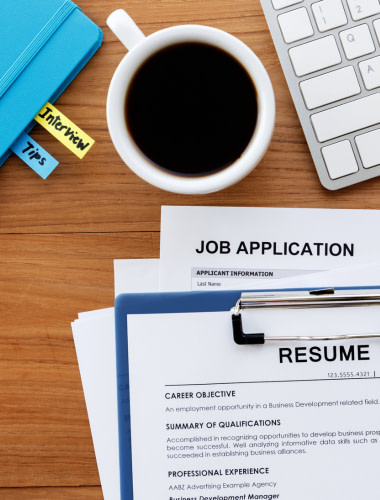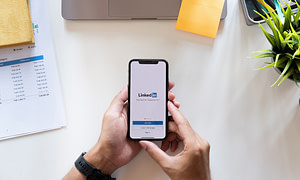This article is recommended for individuals near the beginning of their careers

Are you failing to impress?
Once you apply for a job, if the recruiter is interested in your application, chances are their first action will be to conduct a phone screening to further examine your suitability. Making a good impression during this call is crucial if you want to progress to the next stage - a formal interview.
During my time in recruitment, I have seen many candidates fail to impress during their screening call, despite having the right skills and experience for the job.
For example, some mistakes I have come across include candidates:
In this article, I'm going to provide you with some practical advice on how you can avoid making these mistakes while effectively showing your skills and experiences to the recruiter.

How to record a professional voicemail greeting
When a recruiter calls about a potential job opportunity and the candidate does not pick up, they're more than happy to leave a voicemail message requesting a call back. However, there are some instances where the candidate's voicemail greeting (or lack thereof) can create issues for the recruiter. Here are some common scenarios I have come across.
The candidate's details are missing
If you don’t include your name in your voicemail greeting, then the recruiter won't know if they have reached the right person. I recommend including both your first name and surname.
The greeting is inappropriate or unprofessional
While a funny voicemail greeting might be a hit with your friends, it won’t go down well with a potential employer. Below are some examples that are not appropriate choices for a voicemail message:
“That's right, this is Jane. If you’re hearing this, it means I’m probably trying to avoid you, so don’t leave a message, because no-one likes you.”
“Hello, you've reached Jane. I’m sorry I didn’t answer your call, but I’m afraid you’re not important enough! If I hear your message and deem you worthy, I’ll think about calling you back, but for now... Bye!”
While you are looking for a job, it’s a good idea to keep your voicemail as professional and simple as possible. You don’t want the recruiter to be put off before they even speak to you directly!
There is no voicemail greeting at all
Similar to not including your name, having no voicemail greeting means that the recruiter won’t know if they have reached the right person.
On top of that, they will have to leave a text message or be forced to call you back later in the hopes of reaching you. This can be off-putting for a recruiter, so save their time and increase your chances of success by including a voicemail message.
So, when recording your voicemail meeting I recommend including your first name and surname, keeping it short, and using professional language. For example a greeting like "Hi, you've reached [Your Full Name]. I'm not available to take your call right now - but please leave me your name and phone number and I'll call you back as soon as possible. Thank you!" is perfect.


How to prepare
Not remembering the name, company, or other details about a role you applied for will make a poor impression during a screening phone call. Additionally, if you tell the recruiter that you have applied for so many jobs that you don’t remember theirs, they will be left to wonder why you have been unsuccessful after so many attempts. So you need to be prepared.
To make sure you are prepared for your next screening call. Every time you apply for a role you should create a folder on your computer containing:
To create a list of possible screening call questions, look for the top 3-5 key selection criteria in the job ad. With these in mind, reflect on your past employment and brainstorm which experiences best match the requirements of the role.
In addition to this, Grammarly has compiled a list of common questions you should prepare answers for. Some of these questions include:
You should also be prepared to talk about your proudest professional accomplishment(s), as well as times where you took initiative, dealt with conflict, used problem solving skills, collaborated with others, and went beyond your job description.


When to take the call
Most job-seekers take their screening phone call wherever they are - whether that is in the supermarket, walking the dog, at work, or in a café. These are not places for a confidential conversation, as background noise makes it hard to hear.
More importantly, as addressed previously, the Job Seeker does not have the information about the role, the company etc. in front of them when answering the call, but as they are often so excited about receiving the call (and afraid of losing the opportunity to progress) they say “ABSOLUTELY”.
The appropriate response is more like this.
"Thanks for calling. I would love to hear more about the opportunity. I am out and about/in a meeting/driving, so would it be okay for me to give you a call back in 15 minutes/2 hours? Is 2:15 PM a good time for you? … Brilliant can you please provide me with your name and company, and I will give you a call then…"
If you are driving, ask if the recruiter can text the information to you.
This will give you time to prepare.
We recommend you look through the folder you created when you applied for the role and:
It is a good idea to brainstorm the connections between your skills and experience with the key selection criteria for the role, and to come up with a few success stories that you can tell the recruiter in less than 30 seconds.
Workable suggests being prepared to address any issues a recruiter may identify in your resume, such as gaps in employment, rapid job changes, and industry changes.

How to ace the call
So, now it's time for the most important part - making the call. Here are some tips.
Don’t take the call on speaker
Taking the call on speaker will decrease the call quality, and the recruiter may find it difficult to hear you. If you wish to take notes during the call, use a headset.
Don't hide information
As stated previously, you should be prepared to answer issues in your CV. This could be things such as gaps in employment, rapid job changes and industry changes. You should be honest with the recruiter, as any falsified information may be found out further down the line and you don’t want to be caught out. This includes giving ambiguous and vague answers for personal details.
Relax & give yourself time to prepare
Keeping all of this in mind, remember to relax and be professional on your screening call. Always give yourself the opportunity to prepare - you are not going to miss out on an interview just because you delayed a phone screen
Regardless of the outcome, phone screening calls are an excellent way to prepare for future interviews and handling them well will put you one step closer to landing your dream job.


How to follow up
Following up after a screening call is an important step in the job application process. It shows your continued interest in the position and allows you to reiterate your suitablility.
I recommend emailing the recruiter within 24 hours of the screening call. In this email, you should:
If during the screening call there were any areas where you felt you could provide more information or examples, consider including them in your follow-up email. If appropriate, consider following up through alternative channels such as LinkedIn, especially if you connected with the interviewer on that platform.
Remember to be patient and respectful during the follow-up process. Hiring processes can take time, and it's essential to strike the right balance between expressing interest and giving the hiring team the space they need to make decisions.

Are you looking for a job?
Now that you know how to handle your next screening call, you should take a moment to check our current vacancies page.
At 11 Recruitment, we have a range of white-collar temp and perm jobs available. We're always on the lookout for top talent to place with our clients, so we encourage you to apply for any positions that are of interest.
If none of our current vacancies are right for you, you should register for job alerts. Then we’ll be able to notify you when we receive a position that matches your profile.

What are your thoughts?
I'd love to have a conversation with you about this topic - please leave a comment below if you have any thoughts or opinions 🙂
Christian Madsen
Managing Director of 11 Recruitment





















Thanks for the article – great insight! In your experience as a recruiter, what mistakes do people commonly make during screening calls?
Hi Del, thanks for your comment – I’m glad you enjoyed the article 🙂
Here are some mistakes I often see candidates make – as well as some tips on how to avoid/address them:
Mistake #1: Failing to research the company/role before the call.
To avoid this, you should:
▹ Research the company, its values, and the job description thoroughly.
▹ Be prepared to discuss how your skills align with the company’s needs.
Mistake #2: Being unclear or too verbose in responses.
To avoid this, you should:
▹ Practice concise and clear responses to common interview questions.
▹ Avoid going off-topic and focus on relevant information.
Mistake #3: Overemphasising technical skills and neglecting soft skills.
To avoid this, you should:
▹ Highlight both technical and soft skills.
▹ Talk about qualities like communication, teamwork, and adaptability.
Mistake #4: Not asking thoughtful questions about the company/role.
To avoid this, you should:
▹ Prepare some questions about the culture, team dynamics, or expectations.
▹ Ask questions that show genuine interest and engagement.
Mistake #4: Being too informal or casual in language.
To avoid this, you should:
▹ Maintain a professional tone throughout the call.
▹ Use appropriate language and be mindful of your tone and demeanour.
Mistake #5: Overemphasising salary/benefits during the initial call.
To avoid this, you should:
▹ Try to focus on your interest, the company’s mission, and your fit for the role.
▹ Save detailed discussions about compensation for later stages.
Mistake #6: Not highlighting specific/relevant achievements/experiences.
To avoid this, you should:
▹ Prepare examples to demonstrate how your skills have contributed to successes.
▹ Quantify achievements whenever possible.
Mistake #7: Neglecting non-verbal cues, such as tone and pace of speech.
To avoid this, you should:
▹ Pay attention to your tone, pace, and overall communication style.
▹ Be mindful of your enthusiasm and energy during the call.
Mistake #8: Failing to send a thank-you email or follow-up after the screening call.
To avoid this, you should:
▹ Send a thank-you email to express your appreciation and reiterate your interest.
Mistake #9: Dominating the conversation or providing minimal responses.
To avoid this, you should:
▹ Balance sharing relevant info with allowing the interviewer to guide the conversation.
▹ Listen actively and respond thoughtfully.
By avoiding these mistakes and being well-prepared, you can make a positive impression during your next screening calls and increase your chances of moving forward in the hiring process.